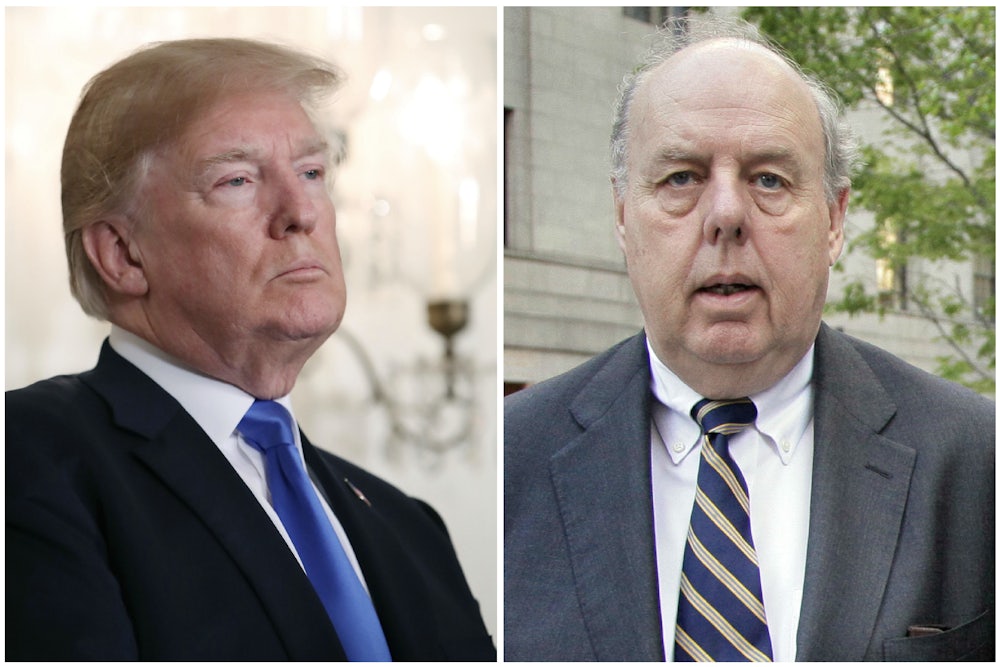The United States is home to 1.3 million lawyers, but President Donald Trump can’t seem to find the right ones to defend him.
John Dowd, who led the legal team representing Trump in the Russia investigation, quit on Thursday after weeks of speculation about his fate. According to The New York Times, the departure stemmed from strategic differences between the prominent Washington defense attorney and his mercurial client. Trump also has reportedly discussed firing Ty Cobb, his other top lawyer in the Russia probe, in what would amount to a wholesale restructuring of his legal team.
Lawyers come and go, but this week’s shuffle highlights a much deeper crisis for Trump: He can’t seem to hire or retain any of the nation’s top lawyers to represent him, even in a case that cuts to the heart of his presidency. As Mueller’s command of the Russia probe nears its one-year anniversary, Trump is increasingly relying on legal advice from lawyers who could inflame his worst impulses instead of those who might counsel restraint.
Dowd’s resignation comes four days after Trump hired Joe diGenova to join his team of legal counselors. The Washington-based defense attorney does have plenty of relevant experience in complex federal investigations: He’s a former federal prosecutor who served as the U.S. attorney for the District of Columbia in the 1980s and as an independent counsel investigating the George H. W. Bush administration in the early 1990s.
But diGenova also holds extreme views that could color his advice to the president. In Fox News interviews over the past ten months, he’s compared the Russia investigation to “regicide,” called for a grand jury probe into the Justice Department, accused various DOJ personnel and FBI officials of breaking the law, and criticized Mueller’s investigations into Paul Manafort and Michael Flynn. These claims mirror Trump’s frequent gripe that Mueller’s probe is an illegitimate “witch hunt.”
Speaking of whom: Mueller hasn’t had any trouble in attracting the best talent. He’s staffed his office with some of the top Justice Department lawyers of their generation. Why the disparity?
The White House reportedly reached out to some of D.C.’s top law firms about representing the president last summer, only to be rebuffed by all of them. Earlier this week, Trump’s team briefly courted Ted Olson, a former solicitor general and one of the nation’s most prominent litigators, who turned down the president’s invitation to join him for a second time. The Washington Post reported last year that Washington’s law firms have generally refused to work for the president because they don’t think he would listen to their legal counsel.
If Trump were fighting a traffic ticket or getting a divorce, his options for defense lawyers would be a bit more plentiful. Guiding a sitting president through a high-stakes federal investigation requires a legal team that can balance a wide array of legal, political, ethical, and constitutional issues, all while standing on the most public stage imaginable. If nothing else, an inexperienced legal team could make it harder for Trump to defend himself.
Trump has largely brought this problem upon himself. He’s proven to be a nightmare of a client, lying so often about matters large and small that his lawyers fear any interview with Mueller would be a “perjury trap.” He frequently comments on the Russia investigation in public, increasing his legal exposure and giving the special counsel more potential evidence of intent. Worst of all, Trump has attempted to fire Mueller at least once, a move that would cause the nation’s worst constitutional crisis since Watergate. Every lawyer has had difficult clients; few of them have threatened the American rule of law.
After firing FBI Director James Comey in May, Trump first turned to Marc Kasowitz, a New York-based attorney known for his work on Wall Street. Kasowitz was a legal fixer for the Trump clan over the years, representing him and his children in cases ranging from a fraud investigation into the Trump SoHo to then-candidate Trump’s litigation threats against the Times for reporting on his sexual-misconduct allegations.
Kasowitz’s antagonistic approach to litigation may have served the president well when he was a businessman in New York City. But that approach, combined with Kasowitz’s lack of experience with complex federal criminal investigations, made the Manhattan lawyer an incongruous choice to represent Trump in the Russia probe. Last June, Trump added Dowd and Ty Cobb, a former federal prosecutor based in Washington. (White House Counsel Don McGahn represents Trump only in his official capacity as president.) Kasowitz left the team in July.
Dowd and Cobb spent the rest of 2017 trying to ameliorate Trump. As the Post reported in December, “when the president frets that Mueller may be getting too close to him, they assure him he has done nothing wrong, urge him to resist attacking the special counsel and insist that the investigation is wrapping up—first, they said, by Thanksgiving, then by Christmas and now by early next year.” It is now spring, and Mueller’s investigation appears only to be gaining steam.
The president’s frustration appears to have rubbed off on Dowd by the end. Last weekend, Dowd told The Daily Beast that he hoped Deputy Attorney General Rod Rosenstein would now fire Mueller and “bring an end to alleged Russia Collusion investigation manufactured by McCabe’s boss James Comey based upon a fraudulent and corrupt Dossier.” Rosenstein has repeatedly said he’s seen no justification to fire Mueller, and Cobb tried to walk back Dowd’s remarks the following day. Five days later, Dowd was gone.
